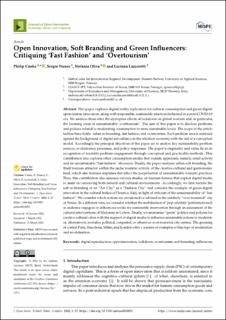| dc.description.abstract | This paper explores digital reality replication for cultural consumption and green-digital open-system innovation, along with responsible, sustainable practices fashioned in a post-COVID-19 era. We address these after the dystopian effects of lockdown on global tourism and, in particular, the looming crisis of unsustainable ‘overtourism’. The aim of this paper is to disclose problems and policies related to moderating consumption to more sustainable levels. The scope of the article tackles three fields: urban re-branding, fast fashion, and overtourism. Each problem area is analysed against the background of digital surveillance in the attention economy with the aid of a conceptual model. Accordingly, the principal objectives of this paper are to analyse key sustainability problem sources, evolutionary processes, and policy responses. The paper’s originality and value lie in its recognition of tractable problem engagement through conceptual and practicable methods. This contribution also explores other consumption modes that tourists appreciate, namely, retail activity and its unsustainable “fast fashion” obsession. Finally, the paper analyses urban soft branding, the third tourism attractor within the niche touristic activity of the creative-cultural and gastronomic kind, which also features impulses that affect the perpetuation of unsustainable touristic practices. Thus, this contribution also assesses various studies on tourism futures that exploit digital media to assist in conserving both natural and cultural environments. Accordingly, we first narrate the soft re-branding of an “Art City” as a “Fashion City” and consider the example of green-digital innovation in the cultural milieu of Florence, Italy, in light of criticism of the unsustainability of “fast fashion”. We consider which actions are envisioned or advised in the similarly “over-touristed” city of Venice. In a different vein, we consider whether the mobilisation of ‘pop celebrity’ performers such as audience engagers or influencers works for sustainable intervention through an assessment of the cultural interventions of Madonna in Lisbon. Finally, we anatomise “green” politics and policies for creative-cultural cities with the support of digital media to influence sustainable actions to moderate or, alternatively, revitalise polluted, congested, or otherwise over-touristed city centres. The greening of central Paris, Barcelona, Milan, and London offer a a series of examples of this type of moderation and revitalisation.
Keywords: digital reproduction; open innovation; lockdown; overtourism; soft branding; influencers | en_US |

